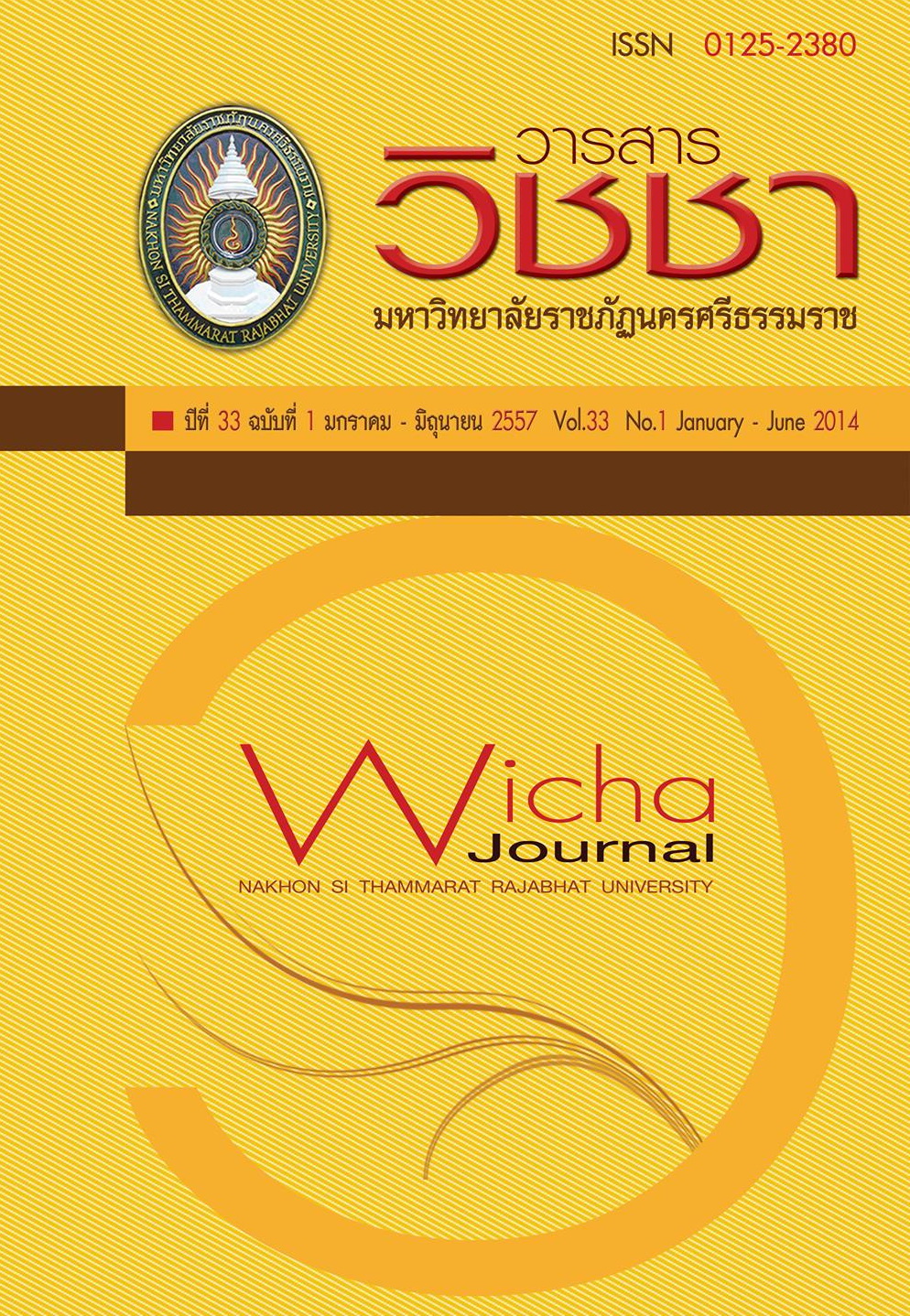ผลของการเสริมกล้าเชื้อต่อการสกัดน้ำมันมะพร้าวบริสุทธิ์ด้วยวิธีการหมัก
Main Article Content
Abstract
น้ำมันมะพร้าวมีคุณค่าทางโภชนาการและประโยชน์ต่อสุขภาพจึงมีบทบาทที่โดดเด่นในอาหารและยาที่สำคัญ ได้แก่ ผลิตภัณฑ์อาหารเพื่อสุขภาพและเครื่องสำอาง การบริโภคน้ำมันมะพร้าวเป็นที่ยอมรับจากผู้คนใน หลายส่วนของโลกมานานหลายศตวรรษ ปัจจุบันน้ำมันมะพร้าวจึงเป็นวัตถุดิบที่มีอัตราความต้องการสูง วิธีการสกัดน้ำมันมะพร้าวทำได้หลายวิธี ได้แก่ วิธีทางกายภาพ เคมี และการหมักด้วยจุลินทรีย์หรือเอนไซม์ การหมักทำได้โดยการนำครีมไปหมักค้างคืนแล้วแยกชั้นน้ำมันออกผลิตภัณฑ์ที่ได้เรียกว่า “น้ำมันมะพร้าวบริสุทธิ์” ซึ่งเป็นวิธีการที่กระทำได้ง่ายและต้นทุนต่ำ งานวิจัยนี้วัตถุประสงค์เพื่อคัดเลือกแหล่งกล้าเชื้อจุลินทรีย์และปรับสภาวะที่เหมาะสมต่อการหมักสกัดน้ำมันเพื่อเพิ่มคุณภาพและปริมาณผลผลิต โดยแยกเชื้อแบคทีเรียจากแหล่งผลิตน้ำมันมะพร้าวและจากศูนย์พันธุวิศวกรรมและเทคโนโลยีชีวภาพแห่งชาติ (BIOTEC)มาทดสอบ พบว่าผลการเสริมด้วยกล้าเชื้อ Lactobacillus sp.(BCC 38040) ที่เพาะเลี้ยงขยายในอาหารเหลว (สูตรน้ำกะทิสด 1000 มิลลิลิตร ประกอบด้วย น้ำตาลซูโครส 20 กรัม ยีสตส์ กัด 5.0 กรัม โพแทสเซียมไดไฮโดรเจนทาเทรต 2.0 กรัม แมกนีเซียมซัลเฟต 0.1 กรัม และแมงกานีสซัลเฟต 0.1 กรัม) ในปริมาณ 1.0% โดยปรับค่าพีเอชของส่วนครีมเป็น 6.0 หมักที่อุณหภูมิ 30 oC เป็นเวลา 24 ชั่วโมง ให้ประสิทธิภาพในการหมักสกัดน้ำมันเท่ากับ 96.93% คิดเป็นปริมาณผลผลิตสูงสุด 335 กรัมต่อลิตรของน้ำ กะทิสด โดยมีค่าคุณภาพของน้ำมัน ได้แก่ ปริมาณน้ำ ค่าเพอร์ออกไซด์ ค่ากรดไขมันอิสระ และค่าซาพอนิฟิเคชัน มีค่าเท่ากับ 0.11 0. 01%, 1.68
0.38 meq/kg, 0.42
0.02% และ 258
5 ตามลำดับ ซึ่งคุณภาพสูงกว่าเกณฑ์มาตรฐานผลิตภัณฑ์ของ มผช.670/2547 และมาตรฐานองค์การอาหารและยาตามประกาศกระทรวงสาธารณสุขฉบับที่ 57 (พ.ศ. 2524)
Effect of Starter Culture on the Extraction of Virgin Coconut Oil through the Fermentation
Coconut oil has a unique role in the diet and pharmaceutics as an important functional food and cosmetics. The health and nutritional benefits derived from consuming coconut oil have been recognized in many parts of the world for centuries. Coconut oil is the raw material that is in high demand nowadays. There are few techniques for coconut oil extraction, such as physical, chemical and fermentation or enzymatic processes. In the fermentation process, coconut cream is utilized for the fermentation overnight; the recovery oil product,is call “virgin coconut oil”. The process is simple and low cost. This research aimed to screen sources of microbial culture and optimize conditions for the fermentation to increase oil quality and oil production efficiency.Starter cultureswere isolated from different sources of coconut oil plants and obtained from National Center for Genetic Engineering and Biotechnology (BIOTEC). The results showed that inoculation of 1.0% starter culture of Lactobacillus sp. (BCC 38040) precultured in a liquid medium (1000 ml fresh coconut milk containing 20 g sucrose, 5.0 g yeast extract, 2.0 g potassium dihydrogentartrate, 0.1 g magnesium sulfate and 0.1 g manganese sulfate) in the cream adjusted to pH 6.0 and incubation at 30oC for 24 hours resulted in 96.93% oil recovery efficiency, representing 335 g total oil yield per 1000 ml of fresh coconut milk. The qualities of the oil including moisture, peroxide value, free fatty acid, saponification value, were 0.11 0. 01%, 1.68
0.38 meq/kg, 0.42
0.02% and 258
5, respectively, which arebetter than the product standardsof Thai Industrial Standards Institute, OTOP standard 670/2547 and Thai Food and Drug Administration,notification No. 57 (2524).
Article Details
เนื้อหาและข้อมูลในบทความที่ลงตีพิมพ์ในวารสารวิชชา มหาวิทยาลัยราชภัฏนครศรีธรรมราช ถือเป็นข้อคิดเห็นและความรับผิดชอบของผู้เขียนบทความโดยตรง ซึ่งกองบรรณาธิการวารสารไม่จำเป็นต้องเห็นด้วยหรือร่วมรับผิดชอบใด ๆ
บทความ ข้อมูล เนื้อหา รูปภาพ ฯลฯ ที่ได้รับการตีพิมพ์ในวารสารวิชชา มหาวิทยาลัยราชภัฏนครศรีธรรมราช ถือเป็นลิขสิทธ์ของวารสารวิชชา มหาวิทยาลัยราชภัฏนครศรีธรรมราช หากบุคคลหรือหน่วยงานใดต้องการนำข้อมูลทั้งหมดหรือส่วนหนึ่งส่วนใดไปเผยแพร่ต่อหรือเพื่อการกระทำการใด ๆ จะต้องได้รับอนุญาตเป็นลายลักษณ์อักษรจากวารสารวิชชา มหาวิทยาลัยราชภัฏนครศรีธรรมราชก่อนเท่านั้น
The content and information in the article published in Wichcha journal Nakhon Si Thammarat Rajabhat University, It is the opinion and responsibility of the author of the article. The editorial journals do not need to agree. Or share any responsibility.


